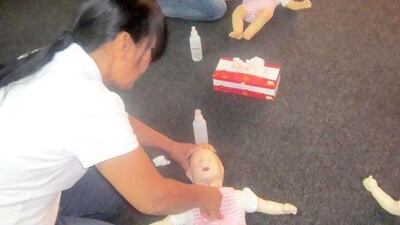New parents often laugh nervously about the fact that they have no idea what they're doing. Looking after children is one of the most important jobs in the world, yet it comes with no training and requires zero qualifications.
The thought of being home alone with an injured child and not knowing what to do is every parent's worst nightmare. As a result, many new mothers and fathers find it reassuring to sign up for a first aid course for infants or a course that focuses on paediatric emergency care. Precious moments can save precious lives.
Accidental injuries are the leading cause of death among children under 14 in the UAE, according to a study released in 2010 by Dr Michal Grivna, associate professor, Faculty of Medicine and Health Science at the University of the UAE. The study found that drowning and falls each account for 10 per cent of accidental deaths among children.
Worryingly, many expatriates leave their children in the care of other people who have no first aid training and often very different ideas about how to deal with emergency situations.
To remedy these problems, The Perfect Help in Dubai offers first aid courses to parents in English and maids in several regional languages. Other companies such as HSS Health & Safety Solutions in Dubai (www.hss-me.com) offer similar schemes.
We asked Deborah Jossa, the founder of The Perfect Help, about the importance of basic medical knowledge.
Why did you decide to offer first aid training at your agency?
The arrival of a first child is a beautiful moment, but also a daunting one. New parents have so many questions and doubts and are always very careful and scared. First aid training gives them the confidence to know that they can handle the worst emergency situation with their infant.
What are the most important elements of the training?
How to deal with critical life-and-death situations is obviously key. In a case of severe choking, caregivers would need to resort to cardiopulmonary resuscitation (CPR). Learning how to perform CPR means you can keep a child alive until an ambulance arrives.
However, non-emergency knowledge is very important, too. When it comes to choking, most mums automatically put their fingers down their child's throat but this will make the situation worse. We try to make caregivers aware of the foods children commonly choke on such as carrots, nuts, grapes, hard sweets and popcorn.
Why do you think maids and nannies should take a course?
In the UAE we often leave our children in the care of maids or nannies who have very little or no formal training. Thus, if an emergency situation occurs they are completely unprepared. Many don't even know the emergency services telephone number.
It is essential that any person who takes care of a child is taught how to perform first aid and CPR. Our courses were designed by Back to Basics and approved by Dubai Corporation for Ambulance Services (DCAS) and the Health Ministry because they are easy to follow and comprehensive.
Do you find parents expect too much of maids?
Yes. We are often surprised to see that expatriates expect their home help to have skills they simply do not possess, and other families just don't think to ask. Leaving your child in the care of an untrained person is extremely dangerous.
Swimming is a big issue because many houses or compounds have swimming pools. It is a parent's responsibility to know whether their maid is a confident swimmer before leaving any child in the water in their care.
Our courses teach maids how to respond to an emergency in a swimming pool, but we recommend keeping pools out of bounds with gates and locks to minimise the risk of accidents.
CPR is a big issue as well, and unless your maid has followed a first aid course she will not be able to perform life-saving CPR.
In which areas do maids often lack knowledge?
We have found that the maids we train always have an open mind and are keen to learn. However, they have very little knowledge and many misconceptions. Treating burns, for example, is something we explain in great length. It is a very difficult topic because everyone has a family recipe or trick they want to apply. If maids aren't trained, they will come up with their own methods.
Other problems may arise when maids come from a country that has different dangers. For example, they might not be aware of the threat of red-back spiders in the summer.
Child-proofing is another subject that typically maids know nothing about. Something as simple as a staircase gate is foreign to them and can often be forgotten.
Can parents and maids take a course together?
We strongly recommend that parents and home help are trained separately so that there is a peer-to-peer learning environment. Many nannies are significantly more involved in practical sessions and more comfortable asking lots of questions when their sponsors aren't training with them.
The good news is that we repeatedly hear that maids and nannies have gained so much confidence from the training and are therefore equipped to react and respond more effectively.
The Perfect Help teaches Emergency Paediatric Response (covering CPR, choking and drowning rescue) and First Aid for Infants and Children (including burns, shock, stings and fractures) every month in Dubai and Abu Dhabi for Dh360 per person. In-home training for groups of six is available for Dh1,995. For a monthly updated schedule visit www.theperfecthelp.com
Follow us
Follow us on Facebook for discussions, entertainment, reviews, wellness and news.

